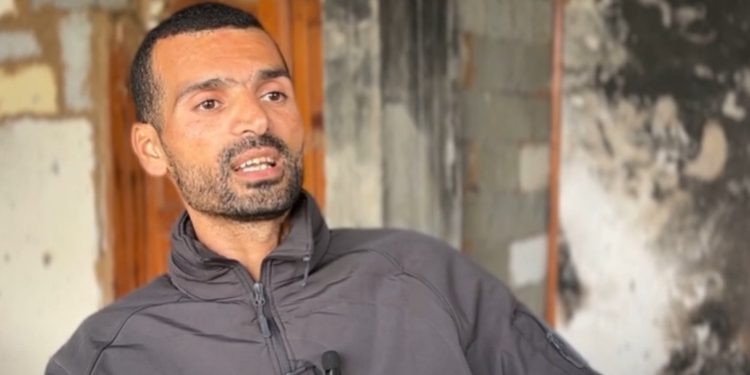A recently released Palestinian journalist, Amin Baraka, has detailed severe mistreatment and systematic torture during his detention in Israeli prisons, highlighting targeted abuse against journalists reporting on the Israeli assault on Gaza. His testimony sheds light on widespread violations of international law, with allegations of psychological and physical torture, prolonged interrogation, and inhumane detention conditions.
Baraka, who was detained without charge, described his arrest as a deliberate attempt to silence his journalistic work. Upon his detention, an Israeli intelligence officer greeted him with the words, “Welcome to hell,” signalling the brutal treatment that awaited him. He was immediately subjected to beatings, stress positions, and prolonged interrogations, during which he was questioned about his reporting on the events of 7 October and Israel’s military offensive on Gaza.
During interrogations, Israeli officers forced him to look at images of other detained journalists and demanded information about them. When he refused to cooperate, the intensity of his torture increased. One officer told him that his home in Gaza had been targeted and destroyed. After his release, Baraka confirmed that his house had indeed been levelled, adding to the psychological torment inflicted during his detention.
Medical examinations conducted upon his release revealed that he had suffered severe physical injuries and lost 26 kilograms due to the conditions he endured. He reported that interrogators had threatened to assassinate him, referencing the targeting of Palestinian journalists, including the family members of Al Jazeera correspondent Wael Dahdouh. These threats, coupled with the prolonged mistreatment, suggest a systematic policy aimed at instilling fear among Palestinian journalists.
Baraka was transferred across multiple Israeli detention facilities over four months, enduring harsh and degrading conditions. Initially held in “Gaza Envelope” detention centres, he spent 13 days blindfolded and handcuffed, before being moved to the Moscobiya interrogation facility, where he was kept in shackles for two months. He was then transferred to Ofer and Negev prisons, where the physical and psychological abuse continued.
Throughout his imprisonment, detainees were subjected to deplorable living conditions, including the denial of basic necessities such as blankets and warm clothing. Many developed infectious skin diseases due to overcrowding and unsanitary conditions, with Israeli authorities providing only minimal medical treatment. Prisoners were given painkillers only in extreme cases, reflecting a pattern of medical neglect that has been widely documented in Israeli detention centres.
Despite the abuse he suffered, Baraka reported that Israeli intelligence officers pressured him to leave Gaza and abandon journalism, warning him against continuing his reporting. He refused, affirming his commitment to documenting Israeli violations and ensuring that the Palestinian narrative is heard.
Upon his release, Baraka learned that two of his brothers had been killed a year earlier, yet Israeli authorities had deliberately withheld this information from him throughout his detention. This deliberate psychological manipulation, combined with the destruction of his home, further illustrates the extreme measures used to punish Palestinian journalists and their families.
Baraka’s account is part of a broader pattern of systematic repression targeting Palestinian journalists and detainees. Since the start of the war on Gaza, Israeli forces have arrested, assaulted, and targeted media professionals, in what rights groups describe as an effort to suppress independent reporting and silence witnesses to Israeli actions.
The mistreatment described in Baraka’s testimony constitutes a serious violation of international law, including the Convention Against Torture and the Geneva Conventions, which prohibit torture, inhumane treatment, and collective punishment. The targeting of journalists and their families is a clear breach of press freedoms and fundamental human rights, raising serious concerns over Israel’s compliance with international legal standards.
Human rights organisations have called for an independent investigation into Israel’s treatment of detained journalists and prisoners, urging international bodies to hold Israeli authorities accountable for human rights abuses in detention facilities. The continued targeting of Palestinian journalists through arbitrary arrests, torture, and threats underscores the urgent need for legal and diplomatic action to protect press freedoms and end impunity for crimes against media professionals in occupied Palestinian territories.



























